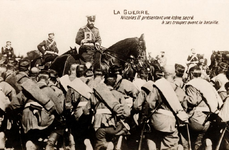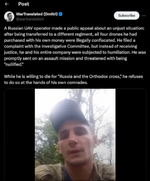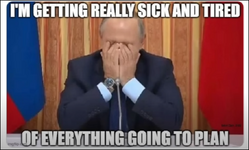-
Features
-
Friends of IIDBFriends Recovering from Religion United Coalition of Reason Infidel Guy
Forums Council of Ex-Muslims Rational Skepticism
Social Networks Internet Infidels Facebook Page IIDB Facebook Group
The Archives IIDB Archive Secular Café Archive
You are using an out of date browser. It may not display this or other websites correctly.
You should upgrade or use an alternative browser.
You should upgrade or use an alternative browser.
How should west respond to potential (likely) Russian invasion of Ukraine?
- Thread starter Harry Bosch
- Start date
Henry-Finland
Senior Member
Russia's Army and Society, Part I
I have attempted to explore and explain the state of the Russian army in two writings/translations on the previous page and the image above.From these, one can gather that civilians originally joined the military either out of necessity or deep-seated belief. There is a certain sense of patriotism among some soldiers, but the officers view everything as an opportunity to use their power to enrich themselves. And there is a mix of all these factors.
It is difficult for a Westerner to comprehend the following, that is, the Russian way of thinking, which has been ingrained in Russians for at least a thousand years:
- God has given power to the Tsar (this also applies to Stalin, Putin, and others who have received power "from above" - Central Committee or whatever).
- The Tsar is God's envoy and the representative of supreme authority, whose decisions cannot be questioned, because doing so would mean questioning divine decisions.

This type of thinking exists in the West as well. At least in Finland, the president's portrait can be found on the walls of official buildings, schools - even if the president happens to be an idiot. Or an egoistic fool
Back to Russia; this divine power extends down the power pyramid to the lowest levels. All the way to the collective farm leader or the factory supervisor. In Russia, if a superior makes a mistake, they shift the blame onto the workers, scolding them, and the workers listen to the reprimand humbly and silently. If anyone dares to question something, they quickly find themselves cleaning the basement—for at least a few weeks.
I know this sounds utterly unbelievable to Western ears.
In the army, this manifests as a complete lack of initiative, with everyone always waiting for orders from above.
This became evident when Ukrainians were being trained in the West—they, too, had been trained and brainwashed in the same way as the Russians. Therefore, the greatest task of Western training was and still is to teach initiative.
The positive trend is clearly visible when Ukrainian soldiers are interviewed, as they have had over 30 years to learn independence.
But in every country, military practices are the last to change within society. Which is not always a bad thing.
To be continued - in some form
Last edited:
Henry-Finland
Senior Member
Russia's Army and Society, Part II
This Can Be Easily Reflected in Western and Russian Society:- In the West, before the Enlightenment and freedom of speech, heretics were burned at the stake, and truth-tellers were persecuted. Significant progress has been made since then, although there is still much room for improvement overall.
- In Russia, truth-tellers are still persecuted, sent to camps, poisoned, or thrown out of windows. The Inquisition—torture—is just one tool among many. People are subjugated, as they have always been. Most people believe that all of this keeps the system intact and that all wrongs will be corrected once the Great Leader is informed.
- The Ministry of Truth monitors the media and various Internet platforms, knows everything, and tells the truth. The truth and the media are retroactively updated based on the current top-down Truth.
- The Ministry of Love ensures that all citizens are content.
- The Ministry of Plenty tells citizens how bad things are elsewhere.
- And the Ministry of Peace explains why the state must constantly protect itself against external threats through various special operations, which are essential for maintaining continuous peace.
Even in the West, there is a common belief that once democracy is achieved (to some degree), it cannot be lost. However, in recent years, people have begun to realize that democracy can indeed be threatened. They begin to understand that democracy is being eroded from the edges, beginning with the education system. And once it is no longer under threat, people believe they can return to focusing on material well-being, entertainment, and pseudo-discussions.
In general, people fail to grasp that democracy must be defended and developed constantly, every single day.
I'll end my sermon here.
Henry-Finland
Senior Member
Broe Birthday Fundraiser Final Report from @69thSniffingBrigade
Donations: 1.270.000 USD giving:
- 30 cars
- 52 Mavic/Autel/ Bomber drones
- 449 FVP-drones
and a lot of jammers
________________________________________________________
The new fundraiser has given almost as much as this: 1.081.000 USD and it is still growing.
Henry-Finland
Senior Member
steve_bank
Diabetic retinopathy and poor eyesight. Typos ...
Long term stress can be debilitating. Stress hormones. It affects cognition, reasoning, and decision making.
Nothing on the scale of a Putin, I experienced it at work and saw extreme cases in others.
I would be surprised if Putin is not taking meds.
Ukraine occupying part of Russia would have hit him like a brick. On top of that he has to be facing the possibility his war will fail, and the possibility of losing power. We don't hear much about inner workings of Russia, but sharks are probably circling. People maneuvering for positions, alliances forming in the Kremlin. Classic palace intrigue.
He can't leave Russia and live on his wealth, at least not anywhere desirable.
Last edited:
Jimmy Higgins
Contributor
- Joined
- Jan 31, 2001
- Messages
- 50,623
- Basic Beliefs
- Calvinistic Atheist
I'm reading up on the area. It seems that Russia's self-appointed position regarding the Orthodox and Slavic protector was in part sourced from Catherine's desire to reconnect (well connect) Russia with the empire of old. I find barbo's posts funny in the sense that he views Russia's position almost as if it were ordained, when it was just as bullshit as anything else that Prussia, France, Ottomans, or England had come up with. All of this Russian territory was the result of wars, invasions, genocides, etc...Russia's Army and Society, Part I
I have attempted to explore and explain the state of the Russian army in two writings/translations on the previous page and the image above.
From these, one can gather that civilians originally joined the military either out of necessity or deep-seated belief. There is a certain sense of patriotism among some soldiers, but the officers view everything as an opportunity to use their power to enrich themselves. And there is a mix of all these factors.
It is difficult for a Westerner to comprehend the following, that is, the Russian way of thinking, which has been ingrained in Russians for at least a thousand years:
- God has given power to the Tsar (this also applies to Stalin, Putin, and others who have received power "from above" - Central Committee or whatever).
- The Tsar is God's envoy and the representative of supreme authority, whose decisions cannot be questioned, because doing so would mean questioning divine decisions.
Russia having a moral high ground is as laughable as saying the US has a moral high ground regarding its own history. Russia (as noted in barbos' posts) is accusing Ukraine of the exact sorts of actions Russia has used in the past (and is currently using), which is why they are so familiar with it.
I have heard from vets that one of the things we have taught the Ukrainians is the way we train all solders it be leaders if need be.
Russia never figured this out.
That is their biggest weakness.
They just throw more bodies at the battle.
Russia never figured this out.
That is their biggest weakness.
They just throw more bodies at the battle.
Henry-Finland
Senior Member
we have taught the Ukrainians is the way we train all solders it be leaders if need be.
Exactly!
TV and credit cards
Contributor
The drones Ukraine is making and the help they're getting doing it. Maybe Biden doesn't need to authorize long range strikes within Russia.

 www.bbc.com
Cheap drones and good software and Russia's got a problem.
www.bbc.com
Cheap drones and good software and Russia's got a problem.
This war is not only going to change the face of warfare, it is going to change the defense industry. Congresscritters will find it difficult to fight for the overpriced weapons produced in their districts.

Ukraine's long-range strikes bring war home to Russia
Western technology and finance are helping Ukraine carry out hundreds of long-range strikes inside Russia.
This war is not only going to change the face of warfare, it is going to change the defense industry. Congresscritters will find it difficult to fight for the overpriced weapons produced in their districts.
Jimmy Higgins
Contributor
- Joined
- Jan 31, 2001
- Messages
- 50,623
- Basic Beliefs
- Calvinistic Atheist
Think of it like a smart phone. The Defense Industry will be getting paid to miniaturize these weapons, make them harder to detect. There are always ways to improve ways to harm people.The drones Ukraine is making and the help they're getting doing it. Maybe Biden doesn't need to authorize long range strikes within Russia.
Cheap drones and good software and Russia's got a problem.
Ukraine's long-range strikes bring war home to Russia
Western technology and finance are helping Ukraine carry out hundreds of long-range strikes inside Russia.www.bbc.com
This war is not only going to change the face of warfare, it is going to change the defense industry. Congresscritters will find it difficult to fight for the overpriced weapons produced in their districts.
T.G.G. Moogly
Traditional Atheist
The Ruski dilemma is that no one is free or knows what that is from experience, not even Russian Hitler. There are no laws except on paper. Commanders of conscripts sell conscript labor and profit by it. Corruption is a way of life. You can't have an NCO corps or even an officer corps that is mission oriented if people aren't free to make decisions. Russian Hitler wants a serf society and that's exactly what he has.I have heard from vets that one of the things we have taught the Ukrainians is the way we train all solders it be leaders if need be.
Russia never figured this out.
That is their biggest weakness.
They just throw more bodies at the battle.
Russian Hitler's present problem with conscripts is particularly acute. Conscripts, by law (yes, I know) are not supposed to be engaged in battle and never in battle that is not Russia. Saying Ukraine is actually Russia is his way of trying to get around the problem.
bilby
Fair dinkum thinkum
- Joined
- Mar 6, 2007
- Messages
- 40,496
- Gender
- He/Him
- Basic Beliefs
- Strong Atheist
It's not a weakness; It's a survival strategy.I have heard from vets that one of the things we have taught the Ukrainians is the way we train all solders it be leaders if need be.
Russia never figured this out.
That is their biggest weakness.
They just throw more bodies at the battle.
Dictators cannot risk having anyone beneath them who thinks they are able to be leaders.
Much less a whole army of them.
If Russian soldiers recognised that they have leadership ability, and that using it would not get them into instant and likely fatal trouble with their commanders, Putin would be overthrown within a week.
T.G.G. Moogly
Traditional Atheist
Stalin's purges were carried out precisely to get rid of rivals so there is no rebellion. Compliance with authority in Russia is simply a way of life. It's what keeps you alive and it's always been that way. No one in Russia knows any other way to live and survive. The Navalnys always die.
Elixir
Made in America
Quite right. The depressing thing is knowing that it’s the model for New Trumpistan.Stalin's purges were carried out precisely to get rid of rivals so there is no rebellion. Compliance with authority in Russia is simply a way of life. It's what keeps you alive and it's always been that way. No one in Russia knows any other way to live and survive. The Navalnys always die.
Henry-Finland
Senior Member
On some discussion boards, I have seen very absurd comments. Now I understand why those comments are quite common:
I was at a Finnish anti-troll board and there I found this:
"In that case, it's best not to respond to the troll's comment. The paid Russian trolls get paid specifically for response comments and all kinds of "likes."
Think about this.
I was at a Finnish anti-troll board and there I found this:
"In that case, it's best not to respond to the troll's comment. The paid Russian trolls get paid specifically for response comments and all kinds of "likes."
Think about this.
Henry-Finland
Senior Member
In my village, there are about 80 people. We do a lot together. Everyone makes moonshine because it's not really prohibited here.
For example, we’ve built a covered celebration area by the village spring. We’ve also planted fruit trees in the area, which anyone is free to pick from. The WC was built from an old phone booth.
This relates to Ukraine in that we plan to hold a celebration at that spot as soon as the Kerch Bridge is destroyed.
Hopefully it will look like this:
There will be various traditional dishes, grilled meat and sausages, as well as moonshine, Irish whiskey, beer, and so on. Soda for the kids.

I've already bought my own bottle: vodka made in Montenegro.
What kind of party will you throw when the Kerch Bridge is destroyed?
For example, we’ve built a covered celebration area by the village spring. We’ve also planted fruit trees in the area, which anyone is free to pick from. The WC was built from an old phone booth.
This relates to Ukraine in that we plan to hold a celebration at that spot as soon as the Kerch Bridge is destroyed.
Hopefully it will look like this:
There will be various traditional dishes, grilled meat and sausages, as well as moonshine, Irish whiskey, beer, and so on. Soda for the kids.

I've already bought my own bottle: vodka made in Montenegro.
What kind of party will you throw when the Kerch Bridge is destroyed?
TomC
Bless Your Heart!
- Joined
- Oct 1, 2020
- Messages
- 11,239
- Location
- Midwestern USA
- Gender
- Faggot
- Basic Beliefs
- Agnostic deist
That video is hilarious. I especially liked the part where Putin got photoshopped into the Munch painting.This relates to Ukraine in that we plan to hold a celebration at that spot as soon as the Kerch Bridge is destroyed.
Hopefully it will look like this:
Tom
barbos
Contributor
How Lenin created Ukraine and Stalin created ukrainians, from ukrainian ukrainian:
Last edited:
Jimmy Higgins
Contributor
- Joined
- Jan 31, 2001
- Messages
- 50,623
- Basic Beliefs
- Calvinistic Atheist
Oh oh, do Crimea next. Don't forget the genocide of the Tatars. That is my favorite part.


